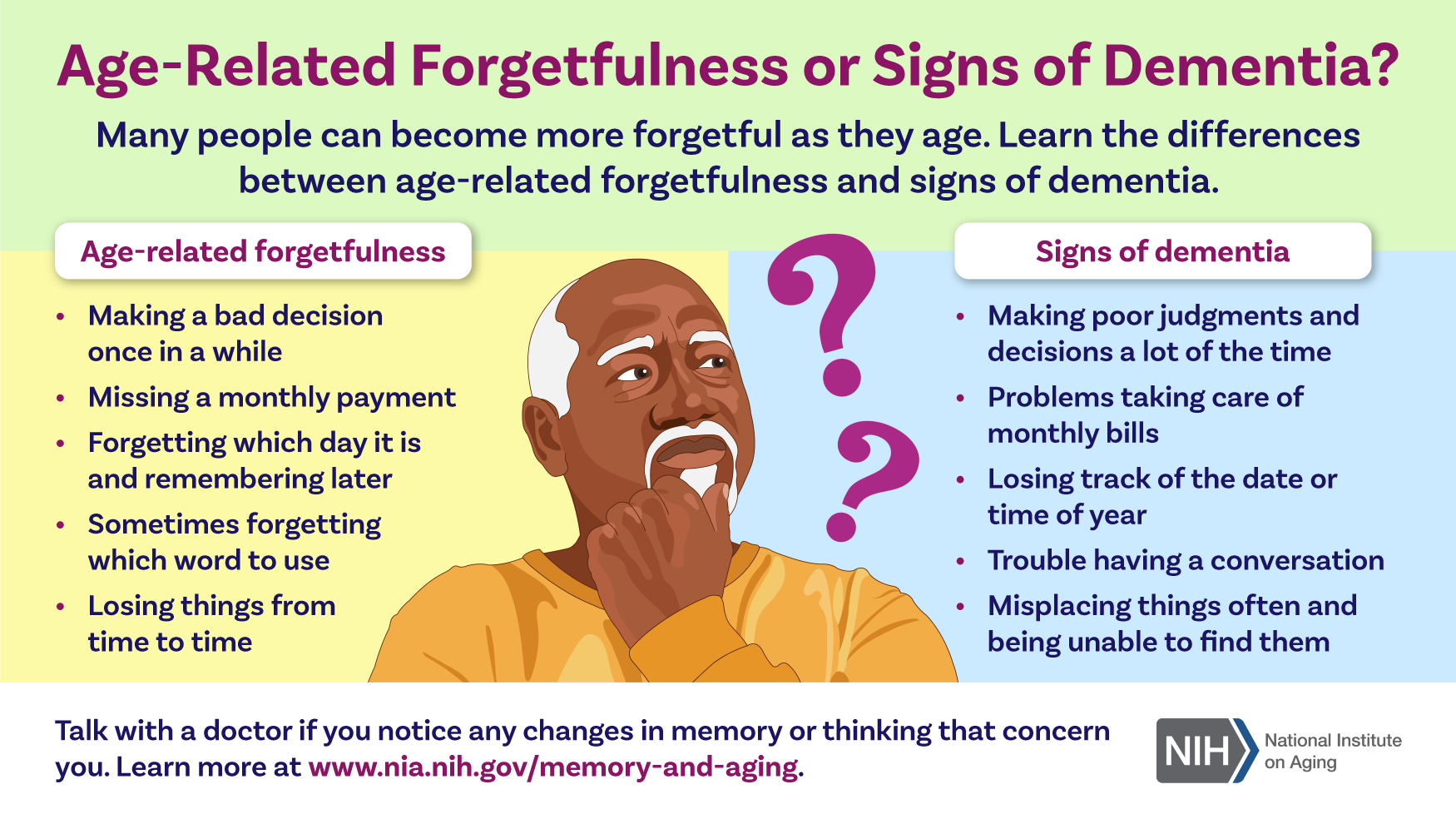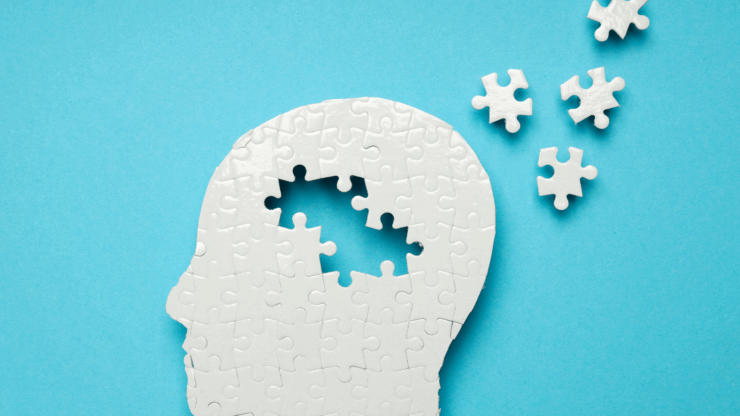
Recognizing the Early Signs of Dementia
Key Takeaways
- Memory loss, confusion, and trouble with daily tasks can signal early dementia.
- Mood shifts, withdrawal, or poor judgment may appear before diagnosis.
- Early signs are often subtle and easy to overlook or dismiss.
- Noticing changes early allows for better planning and support.
- LifeWorx can provide care tailored to evolving cognitive needs.
Dementia is a progressive condition that affects memory, cognition, and behavior, often beginning with minor changes that can be difficult to recognize. Identifying these early warning signs is important, as early diagnosis allows for better treatment options.
The LifeWorx team has put together a comprehensive overview of the first signs of dementia, how to differentiate them from normal signs of aging, and steps to take if you suspect a loved one may be experiencing cognitive decline.
Cognitive signs
Memory loss
Memory problems are the most common and recognizable symptoms of dementia. These issues can affect both the formation of new memories and the ability to retrieve existing ones. Individuals living with dementia may lose track of important dates, misplace items, or struggle to retrace their steps. Additionally, short-term memory loss can make it difficult to recall recent events.
This can also manifest as confabulation, where a person experiencing memory loss creates false memories to fill in the gaps in their recollection. While occasional forgetfulness can be a normal part of aging, memory loss related to dementia has more significant effects on daily life.
Examples:
- Placing items where they don’t belong, such as leaving the phone in the fridge, putting mail in the napkin holder, or unplugging and storing devices and appliances.
- Forgetting whether they’ve completed certain parts of their daily routine, which can lead to repeating tasks, such as taking medications, overwatering plants, and overfeeding pets.
- Confusion about how to use familiar items like a television remote, washing machine, or cell phone.
- Struggling to remember recent conversations, even ones that happened earlier the same day
Task completion
Another early sign of dementia is a noticeable decline in problem-solving skills and logical reasoning. This may include not finishing daily activities, struggling to follow instructions, facing challenges in planning and sequencing tasks with multiple steps, and experiencing fatigue or paralysis.
Examples:
- Struggling with new tasks, such as learning a new skill or hobby, understanding the rules of a new game or activity, or moving around unfamiliar places.
- Difficulties making simple decisions, such as selecting an outfit for the day or deciding whether to take a shower or make breakfast first, often resulting in neither task being done.
- Struggling with planning or executing multistep tasks, such as organizing a shopping list with several stops, budgeting and paying monthly bills, or following a new recipe.
Communication
Dementia can also be characterized by changes in the fluidity and fluency of communication. This can be seen in excessive repetition, pausing mid-sentence, difficulty with word retrieval or recalling names, and challenges in engaging with or following conversations.
Examples:
- When having trouble recalling specific words, they may substitute related or descriptive terms. For example, instead of saying “fridge,” they might say “the place where the food goes.” If they’re trying to refer to a “spoon,” they may use “knife” mistakenly.
- Repetition can occur in various forms, such as perseverating on specific topics, repeatedly using the same phrase or word, asking the same questions, or recounting the same stories during single conversations or successive exchanges.
- Difficulty engaging in conversations often leads to less verbal communication, increased gesturing to fill gaps, and generally less sociable behavior due to frustration.
Psychological Signs
Changes to mood or personality
Dementia is often most noticeable to close friends and family, and it can lead to emotional changes at all stages of the condition. These changes may include anxiety, depression, catastrophizing, irritability, or agitation. These mood swings can be abrupt and may seem out of character for the individual.
Changes to mood or personality can be a direct result of dementia itself or may occur as a secondary response to other symptoms associated with the disease. This transformation can be challenging for others to understand when caring for a loved one who is in the early stages of dementia.
Examples:
- Becoming defensive, agitated, or feeling threatened by others during non-confrontational conversations, often leading to outbursts and overreactions.
- Becoming more passive or withdrawn in social situations, avoiding eye contact, or displaying disinterest in conversations
- Loss of focus or motivation, withdrawal, apathy, and unsociability, along with not participating in hobbies or activities and avoiding interactions with others.
- Unexpected verbal or physical expressions of anger or aggression, usually due to fear or anxiety combined with lower impulse control.
Paranoia
Due to changes in the brain and the emotional impact of experiencing cognitive symptoms daily, individuals with dementia may struggle to control their thoughts and suspicions. This can lead them to draw incorrect conclusions and perceive threats when there are none. As a result, they may develop delusions and paranoia, and in the later stages of the disease, they may also experience hallucinations.
Examples:
- An intense focus on safety measures, such as removing light bulbs from lamps and unplugging cords to prevent accidental fires, frequently changing locks, installing new cameras, and worrying about the consequences of making the wrong decisions.
- Accusations of theft against those around them, obsessive concern over infidelity, and the belief that neighbors are spying on them, or that strangers are out to get them or act purely to annoy them.
- Confabulation involves filling memory gaps with false or distorted memories. This can lead to negative outcomes, such as blaming others for things they misplaced themselves.
Poor judgment
Poor judgment and decision-making are common signs of dementia, affecting areas such as finance, safety, personal hygiene, and general appearance. This condition impacts executive function, impulse control, problem-solving skills, and memory, which can limit a person’s ability to make sound decisions.
Examples:
- Wearing summer clothes in winter, crossing the street without looking for cars, and putting full weight on a recently injured leg while ignoring assistive mobility devices.
- Mismanaging finances, careless spending, or failing to pay bills on time.
- Inappropriate or impulsive behavior, making rude or hurtful comments, being sexually explicit in inappropriate situations, overstepping boundaries, and generally not observing societal norms in an uncharacteristic way.

Other observable behaviors
Visual-spatial difficulties
While more common in certain types of dementia, such as Alzheimer’s, Lewy Body dementia, and vascular dementia, individuals with dementia often struggle with processing 3D information. This can lead to impaired depth perception, difficulties recognizing low-contrast visuals, as well as issues with balance and reading.
Examples:
- Limitations in depth perception can raise the risk of falls, especially when navigating stairs, and can make driving considerably more dangerous. Additionally, individuals with dementia may struggle to judge small distances, which often leads to knocking items over.
- Object recognition and misidentification can also be caused by the visuospatial effects of dementia. For example, individuals may mistake blue floor tiles for a body water or confuse their child with their spouse.
- Difficulty in reading can be influenced by impairments in short-term memory and comprehension, and this challenge can be worsened by deficits to visuospatial abilities. These deficits may lead to problems with visual scanning and tracking lines of text since typical reading materials tend to have low contrast and contain high levels of visual stimuli. Additionally, individuals may struggle with visual discrimination, making it difficult for them to differentiate between words or letters on the page.
Wandering and getting lost
Wandering is a common behavior in individuals with dementia or Alzheimer’s, especially in the middle to late stages of the condition. Approximately 60% of people with these cognitive disorders will wander off at least once. This wandering can occur whether they’re walking or driving. The decline in memory, tasks completion, mood, judgment, and visuospatial abilities can lead to confusion, causing the individual to not recognize their current location, forget whether they should be, or struggle to navigate their way back.
Coordination and control of movements
Dementia is commonly associated with cognitive symptoms, but it can also impact both fine and gross motor skills, both directly and indirectly. Individuals may experience slowed movements, difficulty with balance, increased falls, trouble walking, and challenges with tasks requiring fine, precise movements. This can create a snowball effect: difficulties with daily activities can lead to reduced physical activity, which in turn results in muscle weakness and ultimately contributes to further mobility impairments over time.
Examples:
- Lack of coordination and difficulty completing tasks that require fine motor skills and dexterity, such as tying knots, buttoning buttons, or handwriting.
- Trouble walking or gait disturbances, such as shuffling, reduced arm swing, stooped posture, or postural instability.
- General issues with movement can be presented as tremors, involuntary movements, or muscle rigidity or stiffness.
What to do if you suspect dementia?
While occasional instances of some symptoms may just be signs of normal aging, consistent cognitive difficulties that interfere with daily life are a cause for concern. If you notice that someone’s experiences are affecting their daily life, it’s essential they see a doctor for an evaluation.
Common evaluation methods include:
- Informant Interview: This involves talking to someone who can identify changes in behavior. Informal questions may be asked, or standardized tools such as the Quick Dementia Rating System (QDRS), Ascertain Dementia 8 (AD8), or Neuropsychiatric Inventory Questionnaire (NPI-Q) may be used.
- Standardized Cognitive Tests: These are scored assessments conducted on the individual, like the Mini-Mental State Examination (MMSE), Montreal Cognitive Assessment (MoCA), Abbreviated Mental Test Score (AMTS), or the General Practitioner Assessment of Cognition (GPCOG).
- Word Generation Tests: These tests include tasks like Animal Naming or the Mini-Cog, which combines a three-word recall and a clock-drawing task.
Additionally, physicians may perform lab tests and imaging studies to rule out health conditions that may mimic symptoms of dementia. Common tests include:
- Complete blood count (CBC)
- Thyroid-stimulating hormone (TSH) and glucose tests
- Liver, kidney, and thyroid function tests
- Serum electrolytes and serum calcium tests
- Electrocardiogram (ECG)
- Neuroimaging and tests based on cerebrospinal fluid to detect other biomarkers
Other causes of similar symptoms include:
- Menopause or other hormonal imbalances
- Vitamin deficiencies
- Urinary tract infections
- Functional Cognitive Disorder
- Pseudodementia
- Head trauma
- Advanced liver disease
- Thyroid disease
- Tumors
- Reactions to medication
If you have any concerns, seeking professional guidance is crucial for ensuring safety and health. Early diagnosis not only allows for better management of symptoms but also provides an opportunity to explore treatment options and lifestyle adjustments that may slow cognitive decline.

















